Interview with Cam & Dan | Co-Editors of Craccum 2020
I asked Cameron & Dan a few questions about their time as Craccum's Editors in 2020, and asked them for a bit of advice they'd pass on to future Editors as well.
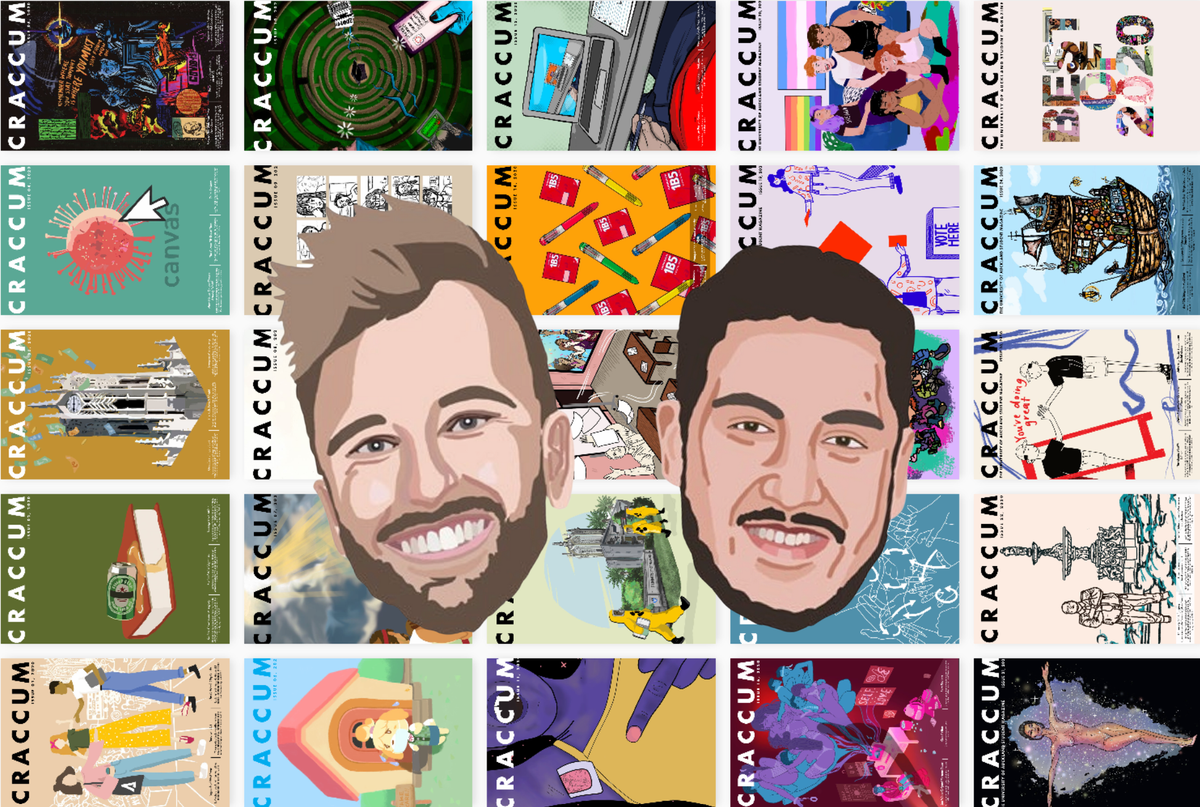
Five years before this year's budget cuts, which led to us having a cyborg monthly-ish Craccum in 2025, Co-Editors Cameron Leakey and Daniel Meech were forced to pioneer publishing Craccum online by the 2020 COVID pandemic. Despite being faced with the curveball of a global pandemic, Cam and Dan swung a home run year for Craccum. For example, you know the Craccum stands around campus and in halls? Yeah, Cam and Dan made them. Indeed, a lot of the Craccum rule book we still use today can trace its roots to 2020 as a foundational year for this decade's vision for the magazine. Craccum was also well recognised at the Aotearoa Student Press Awards that year, taking home Best Photographer, Best Reviewer, Best Sports Reporter, Best Headline, Best Student Politics Coverage, for example.
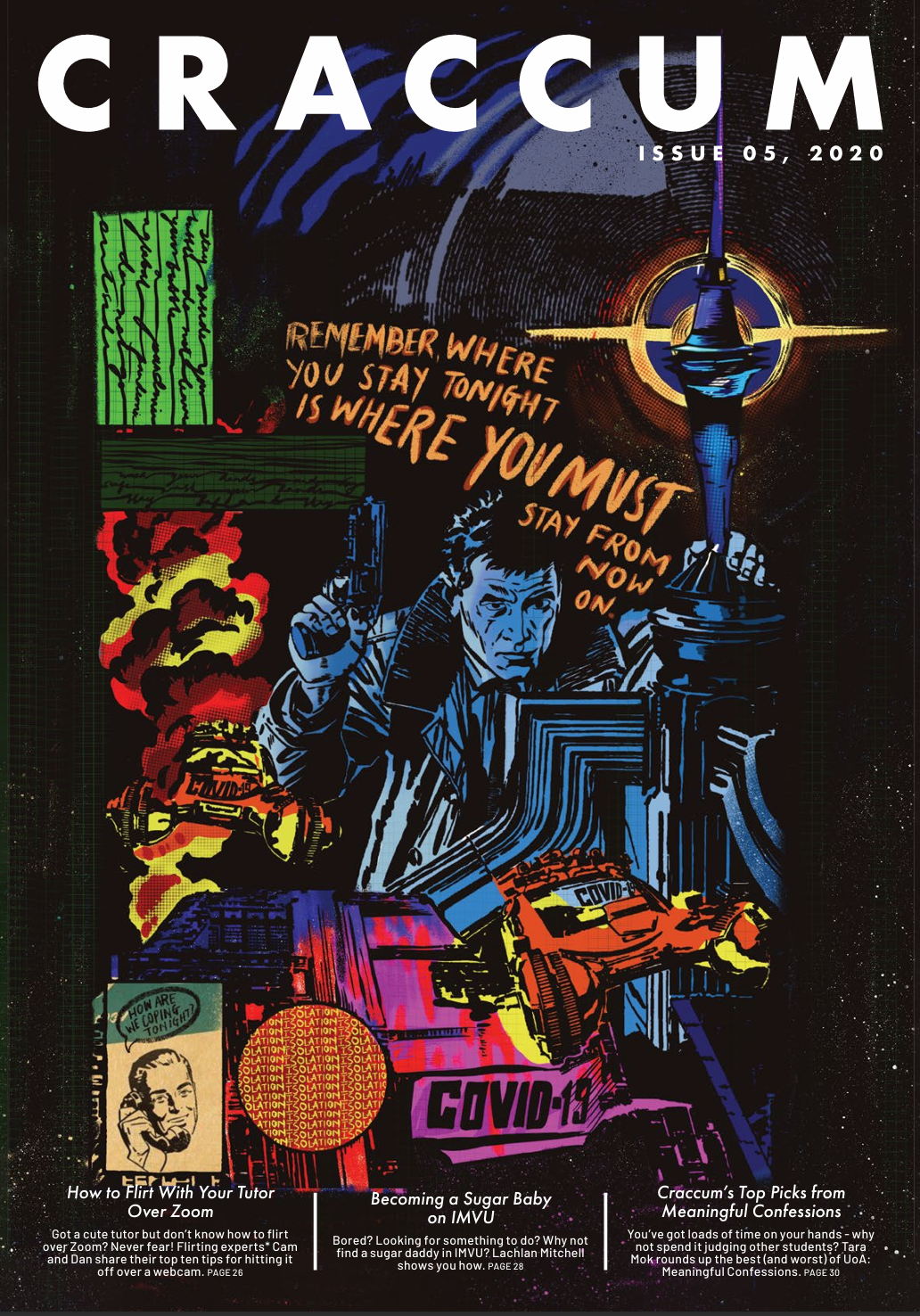
This is the first in a series of interviews on Craccum's legacy. I asked Cameron & Dan a few questions about their time as Co-Editors in 2020, and asked them for a bit of advice they'd pass on to future Editors as well. Without further ado...
Tell us your story with Craccum. When did you first hear of it, when did you start making content for it as a contributor, and how did that translate to you becoming Co-Editors-in-Chief?
Cameron: I remember picking up Craccum during my first year at university, though I confess I don’t think I collected it every week! I then answered a call for contributors in the beginning of my second year of University. I had just changed my degree from Science to Arts and had co-edited my high school paper so thought it'd be good practice to get my hand back into writing and journalism after a stint in the Sciences. I’d have to go find the Craccum’s stashed at my parent’s house to find exactly what my first article was about! After a few months of contributing, there were some changes in staff and they needed someone to take on the News section as a section editor for the rest of the year. So in August 2018 I answered the call. It was fast and interesting work and I became very much hooked on being a part of Craccum and by 2019 I was Features Editor alongside Dan in the News section. By the middle of 2019 we had started to consider the following year and had a few chats about if we could be Co-Editors together. It became clear we had a similar vision. I know we made a very formidable team. We only had to invoke the ‘agree to disagree’ clause once - I think about the colour choice on a page! I’m grateful we got to work together and make Craccum together. It was such a privilege to be Editor-in-Chief and it was made even better by sharing it with Dan.
Dan: The first time I heard of Craccum was when a friend told me it was shit. The second time I heard of Craccum was when I fished a musty old mag out of the magazine bin in the quad*. The edition I read was funny and weird and outrageous and nerdy, and pretty much every other adjective under the sun. I loved it immediately. A few weeks later I had an idea for an article and handed it in. Somehow it got published, and from then on out I would dip my toes in to contribute whenever a good (or, more frequently, a good-but-really-quite-bad) idea came to mind.
In 2019, spurred on by my love of Craccum, and, equally by my love of not being broke, I signed up to be Craccum’s news editor. Me and Cam started working together, and over the course of that year we realised:
- We didn’t hate each other
- We were both really good at our job, and
- We had pretty much the exact same idea of what we wanted the magazine to look like, and what we needed to change to get it to that point.
Towards the end of the year we had a couple coffee catchups to figure out if we thought co-editorship could work (spoiler alert: we thought it could), and then committed to it. Like Cam said, I’m so glad that we did!
Despite our wild and intense personal feuds (which culminated in Cam locking himself in the office with a Garfield phone and a mountain of cocaine, Scarface-style)**, professionally, we got along like a house on fire. I genuinely and whole-heartedly believe that editing the mag with Cam made the magazine, and also my experience, so much better and more memorable! I couldn’t imagine doing it any other way now – it just wouldn’t feel as meaningful. Life is fun when you’re doing cool things, but it’s even more fun when you’re doing cool things with cool people.
Also, for the record, I just want to say that I’m pretty sure we were the first to kick off (or at least re-kick off) the co-editor trend that has continued to this day. In the words of Abraham Lincoln: “everybody seen us, now everybody wanna be us”.
* They’ve probably removed the magazine bin since my dinosaur days, but I hope not – it was this gigantic wooden box, painted orange, that looked like the weird love child of a coffin, a road cone, and an old rubbish skip.
** Craccum has been unable to confirm the veracity of this statement.
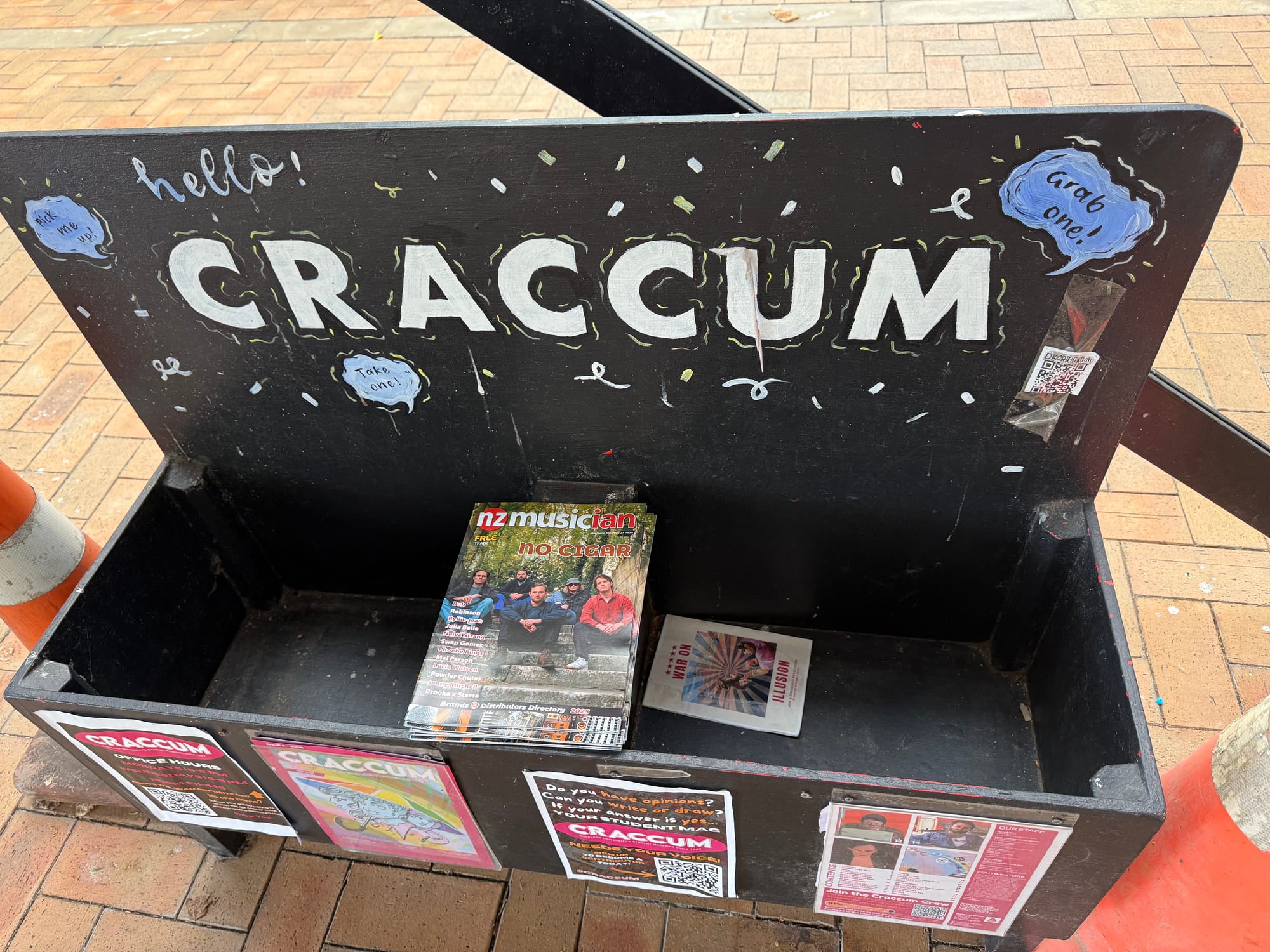
How would you describe the spirit of Craccum in your year? Would you say it was a continuation or a break from the style of the previous year?
Cameron: I think a bit of both! We had a lot of chats about Craccum keeping its soul from before but continuing to evolve so that each year feels like it’s moving with the time. That being said, we had the COVID-19 pandemic erupt in our year and after only about 3 or 4 issues we had to pivot to being an online weekly publication - the first time in Craccum’s history. I think if you look at our year it feels like a step in the evolution of the magazine albeit we weren’t in print as much as we expected. Perhaps scrolling through the archive you might get some vibes of isolation or pandemic wariness, like how much of the media of that time is tied to how society was feeling. There were a lot of articles about Zoom lectures and calls. I’m not sure our flirting with your tutor over Zoom article ever got anyone lucky unfortunately.
Dan: Totally agree with what Cam wrote. COVID was THE BIG THING for the entirety of our year, and everything we wrote and did and thought about reflected that. That said, I think even without COVID coming into play, we had discussed shifting the focus toward being a student-first publication, and in that sense it was a break from previous years (less so from the year directly before us, but definitely when compared to the years before that). I think that plus all the COVID stuff gave the mag a real “local” feel. Cam and I really banged the drum on keeping stories student-focused, and I think that resonated with a lot of people when there was so much uncertainty about life and university and being a student.
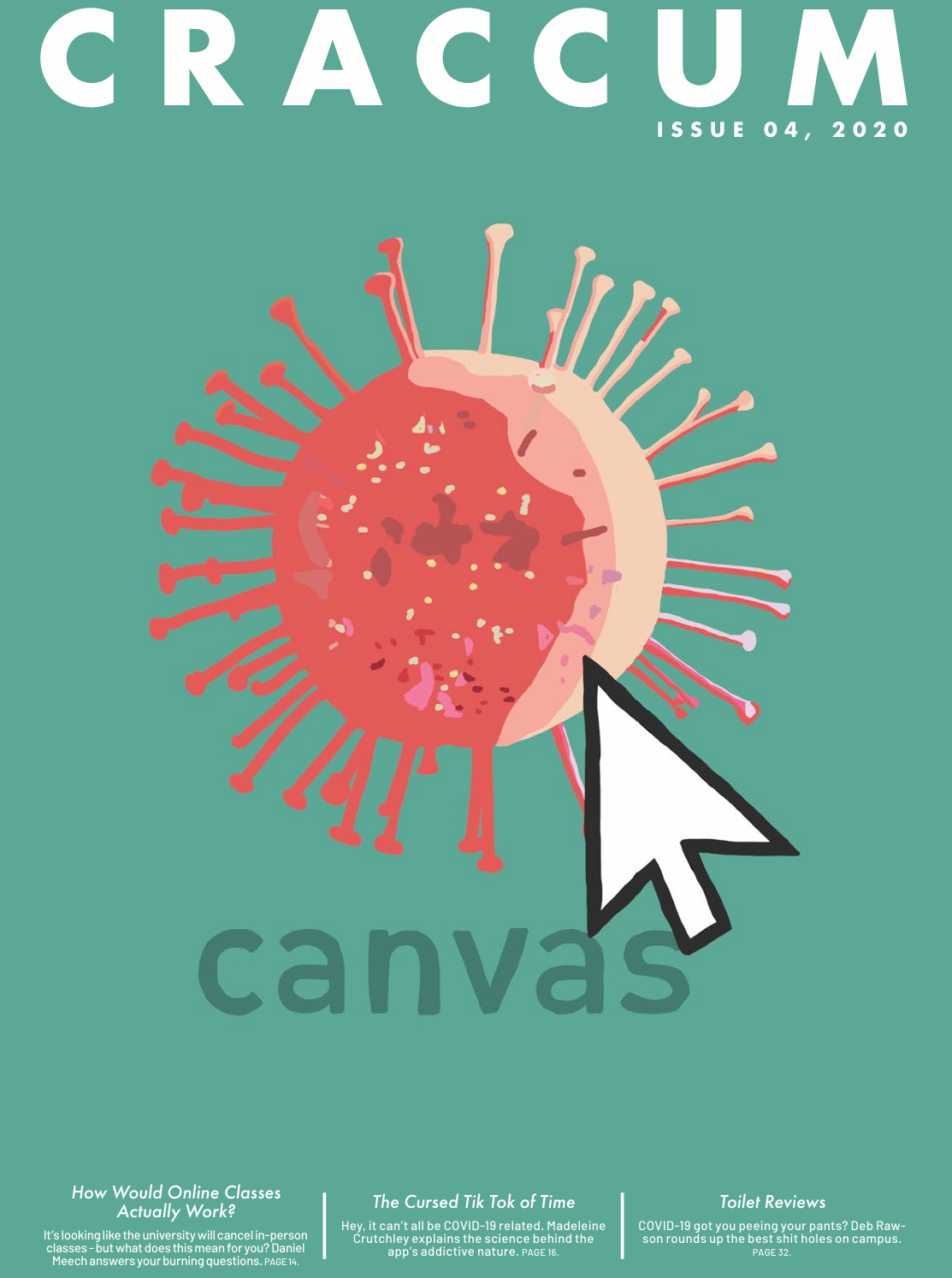
What was something new to Craccum you introduced in your year? What was the rationale behind it?
Cameron: I remember us making sure all words didn’t hyphenate over the next line…. I truly can’t remember what we did differently exactly! Some style choices definitely but we retained a lot of elements.
Dan: Aside from that very important change highlighted by Cam (I joke, but I remember we legitimately had a meeting with our designer about that), the things that stood out were:
- we applied as co-editors! which the board thought was a bit odd, but ultimately agreed to let us do (suckers)
- we refreshed the Craccum website (with immense thanks to Nick, our long-suffering and ever-patient designer!)
- we made a bunch of magazine stands and distributed them throughout the uni, on the basis that it was better to have a bunch of stands spread out across all campuses rather than one big bin in the quad. (I remembered I just chucked all the stands in my car and drove around dropping them off at random spots that looked like they got good foot traffic (and eventually in all the halls too). To this day, I don’t believe I was actually allowed to do what I did, but I think we got away with it because everyone just assumed the boxes were official)
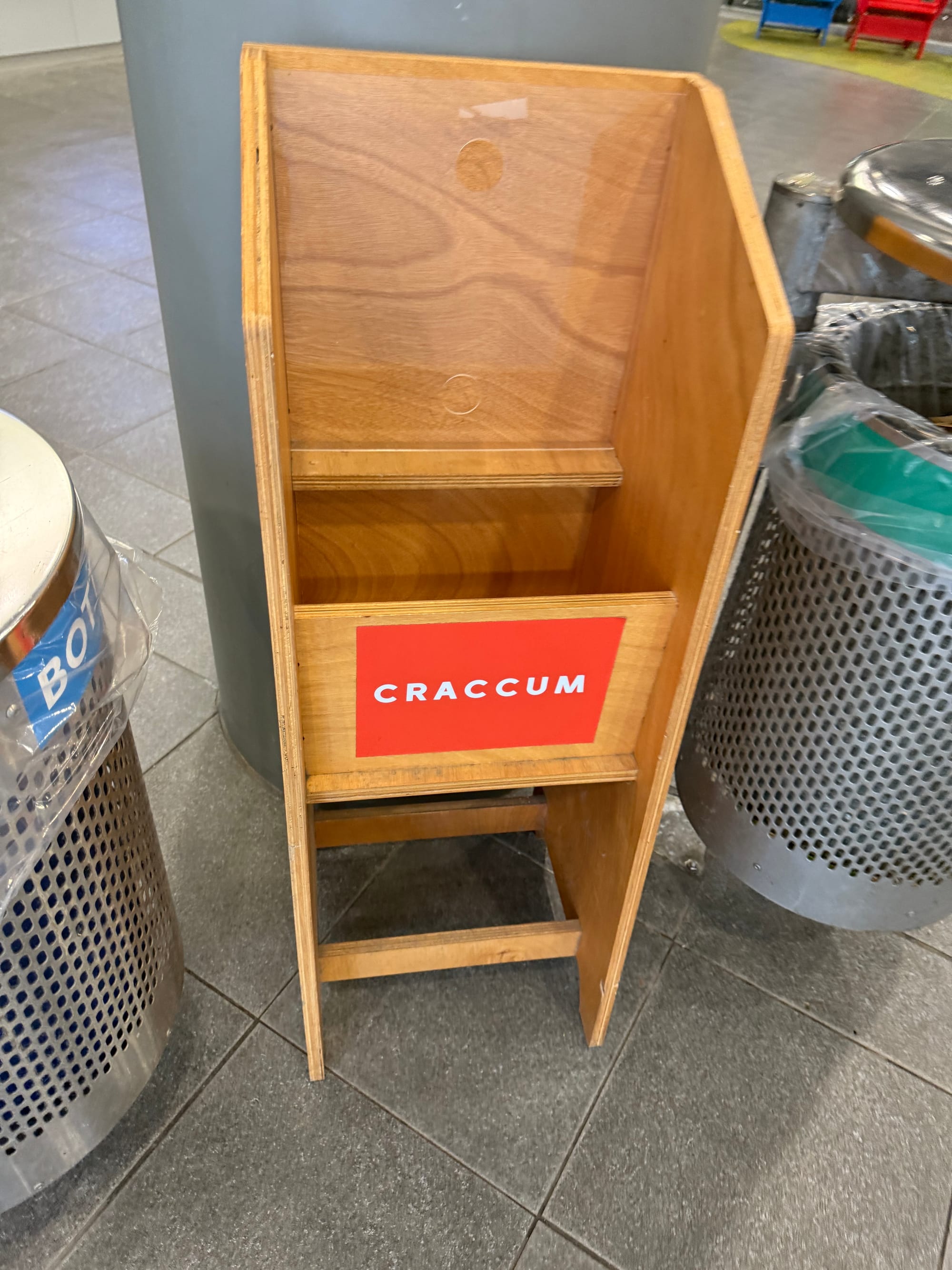
- we revamped the facebook page and all the branding (I whipped up the white-on-yellow logo and facebook banner during a land law lecture – glad to see it’s still in use to this day)
- we put a massive emphasis on managing and growing Craccum’s online presence (we took the Facebook page from 4k to 11k followers that year, and had a couple posts with over a thousand engagements – still proud of that one)
- we started tracking basically every number we could think to track, including how many copies got picked up from the different bin locations, how many people visited the website, and how many engagements we got on social media at different times of the day, etc, to try and optimise EVERYTHING! (side note: turns out its really helpful to have this stuff when you’re asking advertisers for money! I’d recommend that everybody do it)

I could keep going for days. It was a real labour of love, and me and Cam tried absolutely everything we could think of in the hopes of making things stick. It was a heap of fun – and most of it did stick in the end, which is kind of nice to think about. For current and future editors – don’t be afraid to try new things! The freedom is so much fun.
What was an issue or article you remember you were particularly proud of, and why?
Cameron: I can tell you one I’m not proud of! Dan and I’s column where we basically ‘keep calm and carry on’ed’ COVID. Yikes. That aged like milk…. I’m proud of the reporting we did on COVID and how we reached students. A few pieces got picked up for The Spinoff which we were chuffed about. I did an interview with KnowYourStuff while drug testing at festivals was still niche and new. That chat was fascinating. I also wrote some personal pieces including for our pride edition that I still read over sometimes. My most controversial article amongst my friends was where I ranked the flavour of Shapes. I cannot believe the amount of vitriol my friends threw at me for that one and I maintain to this day that Pizza shapes are in fact the superior shape. I appreciate this forum to again spread that important message.
Dan: Agreed with Cameron (except about the shapes – the pizza flavoured shapes are objectively awful). There were so many different issues and articles that stand out as being worthy of praise – we had some investigative pieces about the university that made it to the Spinoff and RNZ, a few really thoughtful pieces about personal experiences through university and life, hilarious and outrageous articles about studying during COVID (the article about flirting with your tutor over zoom, and the smut piece about having sex with an at-home exam come to mind), and heaps of interesting interviews with people and organisations that were doing cool stuff in the student space. Also our visual arts contributions that year were out of this world! Some of our cover art in particular was genuinely world class.
Weirdly though, I think what I’m most proud about isn’t an issue or an article, but the community we built. When we took over the magazine, we had the dual objectives of moving Craccum back towards its student roots, and building up more of a volunteer and contributor network, and I think we pretty much nailed both objectives. By the end of the year, we had a way bigger audience than I thought we could ever achieve, and also (and probably relatedly) a way bigger network of contributors and volunteers and people just kind of in and around the magazine. It felt like we’d built up a community around Craccum that hadn’t been there before (at least not to that extent), and that was something that felt way bigger, and way more special, than any individual article.
What was the hardest part of working for Craccum? How did you manage the workload?
Cameron: At the time we did Craccum we were also pandemic’ing, studying, working - just being a human with multiple things happening. That’s what it is to be a student though. You can’t just be a full time student nowadays nor do you want to be because experience is important too. I still don’t think politically that message has gotten through. Somehow we managed the workload. I think having a good team around us really was the key. I’d give full props to everyone in our 2020 Craccum team (and all the teams I worked in really) for the way we supported each other especially in the ‘unprecedentedness’ of it all.
Dan: It’s so cheesy, but I don’t really think there ever was a hard part. I loved the work, I loved the people we worked with, and I loved making something and giving it to the world and watching it grow.
Like Cam said, it helps that we had an amazing team full of brilliant people that year (as evidenced by the fact that each and every one of them has gone on to be scary successful in their own way since). Eda, Brian, Ella, Justin, Lachlan, Maddy, Sherry, Talia, and the hundreds of contributors that are far too many to name, love you all and hope that you’re well! You were amazing writers, editors, and people, and we were blessed to have been able to go on the journey with you.
The workload was a lot, but we did a good job of helping each other through the rough patches. Like I mentioned earlier, I think one of our genius moves that year (if I could be so bold) was to really lean into, and build back up, a wider Craccum community. Through that we managed to get enough people interested in being a part of it to the point where it never really felt like the work got overwhelming. There were a few all-nighters, and you’d have to get on the phone to strong-arm a mate into writing a funny filler article once in a while, but I kind of loved that aspect of it.
How did you go about getting contributor submissions? And was it successful?
Cameron: We did call outs regularly and at the beginning, where we couldn’t offer positions to people, we encouraged folks to keep writing for us and to contribute. Otherwise we wrangled our mates and classmates and peer pressured them into writing. Considering a magazine got published weekly I am going to call it a success.
Dan: I think Cam is probably underselling it! One of the problems I think editors can run into is assuming that the relationship with contributors is transactional – you put out an add for a contribution, someone decides to write up a contribution, you publish it, and that’s that. The reality is that no-one wants to contribute to something they don’t care about, and most people don’t care about things that they’re not a part of. So you have to kind of build up a community around the magazine first and then pull from that community after.
To try and create that sense of community, we ran volunteer and contributor pages, had drop-in sessions, had volunteer days, and I think more than anything just tried really really hard to create a personal connection between the team, the contributors, and the wider community in general. The little things really matter – we used to meet with our contributors face to face, let them use the office, let them eat the food in the fridge, etc, and I think those little gestures over time help to make people feel like they’re part of something. And when they feel like they’re part of the club, and like they get a say in how it runs and what it is, they’re happy to help out!
As an aside, it’s amazing how many contributors I’ve run into after finishing university. I’ve bumped into people in the street, had people call me to say they saw my name on the work e-mail list, and even had some contributors asking for references. I think it’s kind of beautiful that those things happen – like little memories of this wonderful life you built together!
What do you think was the greatest challenge UOA students faced in your year? How did Craccum report on it/make a difference?
Cameron: COVID-19! Figuring out how to be a student amidst all of that. We also reported a lot on university decisions related to COVID-19. There was a delay in comms between different sectors of the University so many times we broke news about COVID-19 and often were ahead of the university! We even got called into a meeting with the uni comms department to ‘collaborate’ though really they wanted to know how we were beating them to it.
Dan: Cam nailed it – COVID was crazy, and our reporting was the best. Shout out to Justin, Ella, and the many students and staff who gave us tips.
What was one thing you would do differently running the magazine if you had to do it all over again?
Cameron: I’d say I’d write my editorial more in advance but really I think I probably would be writing it at just the last minute regardless. That’s part of the charm of the editorial!
Dan: Have more yellow. I think yellow is just an under-rated colour in general. Also more volunteer parties – we had a couple but never as many as we wanted due to COVID.
Anything you’d like to say or pass on to future Craccum editors?
Cameron: To just remember that you’re documenting history. We found Craccum’s from years past that really spoke to the political and social climate of the time and it’s an honour to know we are part of that legacy.
Dan: A student magazine is just that: a magazine for students. Recognise that and lean into it! Don’t try and compete with the Guardians and the Vogues and the Economists of the world. They have more money, better writers, and a bigger audience than you, and it’s pretty arrogant to think otherwise. If you cover the same stuff as them, you’ll lose because no-one will have a reason to read your stuff – and more importantly, students will lose too, because no-one will be covering the stuff that matters to them! Big magazines and media outlets have heaps of advantages over student magazines, but student mags have one massive advantage over them: they’re the only place dedicated to, and deeply connected with, students and their stories. There are heaps of stories to be told in the student world, and they all deserve to get their airtime. You’re kind of the only people who care enough and are close enough to do it. So do it! And do it with pride! (And, to be clear, while student stories can be silly and funny and outrageous, I’m not just talking about those stories – there are plenty of thoughtful and change-provoking stories too, like the stories we ran about the misappropriation of university funds, the issues facing international students, and the university’s border-line illegal social media stalking. You just have to go looking for them.) Lean into your advantage: make something that’s original, fun, and speaks to the unique student experience. You will be rewarded, I promise!
Lastly, if you could ask a question to a previous Craccum editor for advice, what would it be?
Cameron: Why on earth did you choose the name Craccum?!
Dan: Yeah, actually, what the fuck was that?
Indeed, what the fuck. Anyway, I'd like to thank Cameron & Dan for so generously opening up to us about their thoughts, time and experiences with Craccum. If you enjoyed their dialogue as much as I did, I recommend flicking through some issues from 2020 on our archive.





